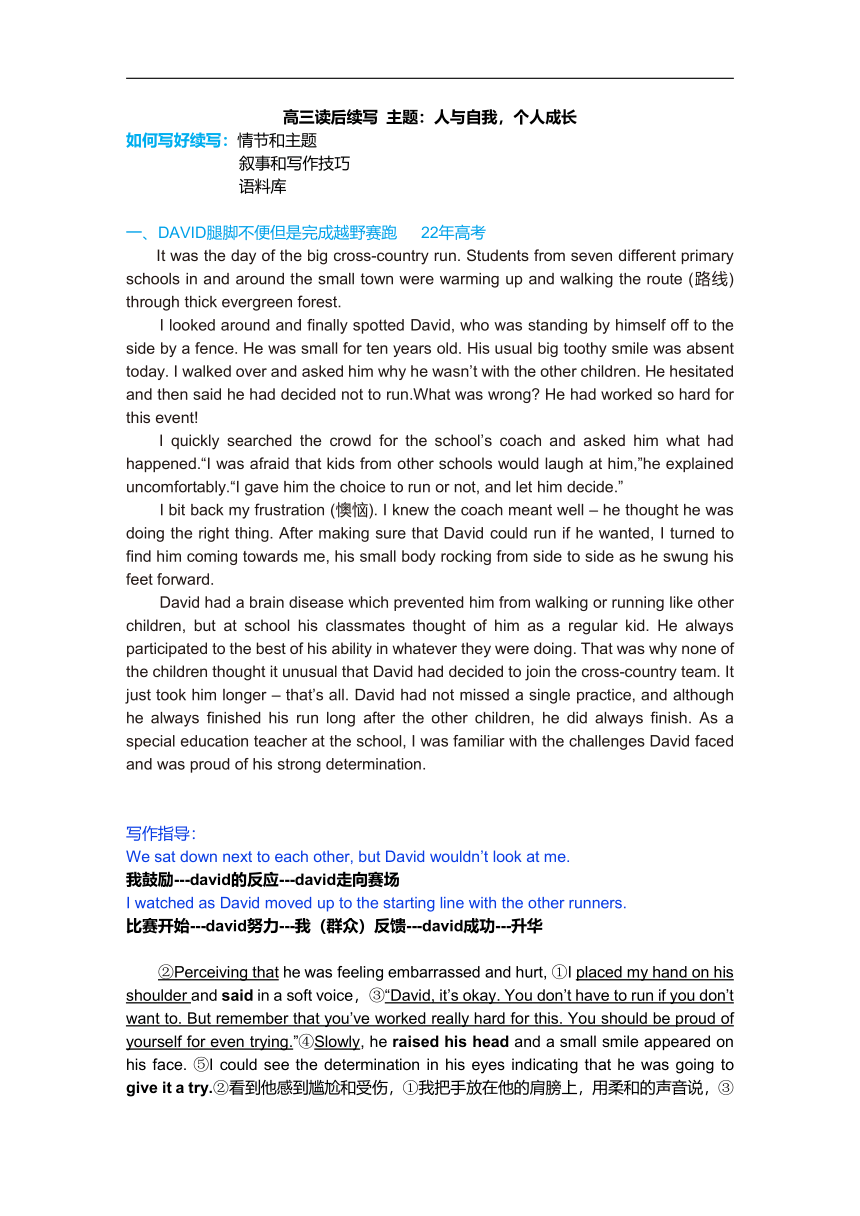
高三读后续写 主题:人与自我,个人成长 如何写好续写:情节和主题 叙事和写作技巧 语料库 一、DAVID腿脚不便但是完成越野赛跑 22年高考 It was the day of the big cross-country run. Students from seven different primary schools in and around the small town were warming up and walking the route (路线) through thick evergreen forest. I looked around and finally spotted David, who was standing by himself off to the side by a fence. He was small for ten years old. His usual big toothy smile was absent today. I walked over and asked him why he wasn’t with the other children. He hesitated and then said he had decided not to run.What was wrong He had worked so hard for this event! I quickly searched the crowd for the school’s coach and asked him what had happened.“I was afraid that kids from other schools would laugh at him,”he explained uncomfortably.“I gave him the choice to run or not, and let him decide.” I bit back my frustration (懊恼). I knew the coach meant well – he thought he was doing the right thing. After making sure that David could run if he wanted, I turned to find him coming towards me, his small body rocking from side to side as he swung his feet forward. David had a brain disease which prevented him from walking or running like other children, but at school his classmates thought of him as a regular kid. He always participated to the best of his ability in whatever they were doing. That was why none of the children thought it unusual that David had decided to join the cross-country team. It just took him longer – that’s all. David had not missed a single practice, and although he always finished his run long after the other children, he did always finish. As a special education teacher at the school, I was familiar with the challenges David faced and was proud of his strong determination. 写作指导: We sat down next to each other, but David wouldn’t look at me. 我鼓励--david的反应--david走向赛场 I watched as David moved up to the starting line with the other runners. 比赛开始--david努力--我(群众)反馈--david成功--升华 ②Perceiving that he was feeling embarrassed and hurt, ①I placed my hand on his shoulder and said in a soft voice,③“David, it’s okay. You don’t have to run if you don’t want to. But remember that you’ve worked really hard for this. You should be proud of yourself for even trying.”④Slowly, he raised his head and a small smile appeared on his face. ⑤I could see the determination in his eyes indicating that he was going to give it a try.②看到他感到尴尬和受伤,①我把手放在他的肩膀上,用柔和的声音说,③:“David,没关系。如果你不想跑,你就不必跑了。但请记住,你为此工作得很努力。你应该为自己的尝试而感到骄傲。④慢慢地,他抬起头来,脸上露出了一丝微笑。⑤:我能从他的眼睛里看出这个决心,这表明他要试一试。 ①在呈现核心动作(say)之前,加入一些前置的动作,使得整体动作细致而连续,即“动作链”,此处用“手部动作+语言”。 ②在某人做动作之前,加入“想到了什么”,因为人往往是认知先到位,才会指导行动。 ③用言语安慰人时,先肯定 ... ...
~~ 您好,已阅读到文档的结尾了 ~~

